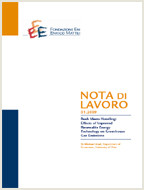Abatement Technology and the Environment-Growth Nexus with Education

29.01.2011
Xavier Pautrel
Q5, Q58
Growth, Environment, Overlapping Generations, Human Capital, Abatement
Climate Change and Sustainable Development
Carlo Carraro
This article challenges the conventional result that a tighter environmental tax has no long-run effect on human capital accumulation in the presence of pollution arising from final output production. It demonstrates that the technology used in the abatement sector determines the existence and the direction of the growth-effect. A tighter environmental tax rises (respectively reduces) human capital accumulation in the presence of pollution arising from final production, if the abatement sector is relatively more intensive in human (resp. physical) capital than final sector. That result always holds for finite lifetime but for infinite lifetime it only holds when labor supply is endogenous. The transitional impact of a tighter environmental policy is also investigated.
